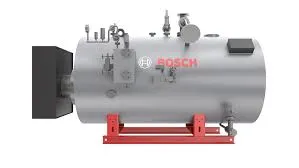
Nov . 24, 2024 01:52 Back to list
gas fired thermal oil boiler
Gas Fired Thermal Oil Boiler A Comprehensive Overview
Gas fired thermal oil boilers have gained prominence in various industrial applications due to their efficiency, reliability, and versatility. These systems utilize gas as a fuel source to heat thermal oil, which is then circulated through a network to transfer heat to different processes. This article delves into the operational principles, benefits, applications, and considerations involved with gas fired thermal oil boilers.
Operational Principles
At the core of a gas fired thermal oil boiler lies the principle of heat transfer through thermal oil, commonly referred to as heat transfer fluid (HTF). Unlike traditional water boilers, which operate at high pressures and temperatures, thermal oil operates at lower pressures while achieving higher heat levels. The thermal oil is heated in the boiler by burning gas, typically natural gas or propane, which produces hot flue gases that pass through a heat exchanger. The thermal oil absorbs this heat and is then circulated to various heat exchange applications.
One of the significant advantages of thermal oil systems is their ability to reach and maintain high temperatures without pressure. The boiling point of thermal oil is significantly higher than that of water, allowing for temperatures exceeding 300°C (572°F) without the risk of vaporization. This characteristic makes thermal oil systems ideal for applications that require consistent high temperatures.
Benefits
1. Efficiency Gas fired thermal oil boilers are designed to operate at high thermal efficiency. By using advanced combustion technology and optimized heat transfer surfaces, these boilers ensure minimal energy loss and lower operating costs.
2. Versatility The use of thermal oil makes these boilers suitable for a wide range of applications, from food processing and chemical manufacturing to pharmaceuticals and textiles. The ability to control the temperature precisely allows industries to tailor their heating processes according to specific requirements.
3. Low Maintenance In comparison to steam systems, thermal oil boilers typically require less maintenance. The absence of high-pressure steam reduces the complexities involved with boiler inspections and repairs, thereby lowering operational downtime.
gas fired thermal oil boiler

4. Environmental Considerations Gas fired boilers produce fewer emissions than coal or oil-fired systems, making them an eco-friendlier option. Modern gas burners are equipped with emission control technologies, further reducing the environmental impact.
Applications
Gas fired thermal oil boilers are employed across various sectors. In the food and beverage industry, they are used for processes like drying, roasting, and pasteurization. The chemical industry utilizes thermal oil for reaction processes, distillation, and other heating requirements. In the textile industry, they serve to provide heat for dyeing and finishing operations. Their adaptability to high-temperature applications gives them an edge over traditional heating systems.
Considerations
While gas fired thermal oil boilers are highly efficient, certain considerations should be taken into account. Proper selection of thermal oil is crucial, as it impacts system efficiency and safety. Users must also ensure that the heating system is integrated with the correct safety devices to prevent overheating and ensure compliance with industry regulations.
Additionally, the choice of gas as a fuel source is pertinent. While natural gas is often the most common fuel, the availability and cost of gas, as well as pipeline infrastructure, can influence decisions made by operators. Therefore, companies should evaluate their specific needs, operational costs, and availability of fuel sources to optimize their heating solutions.
Conclusion
Gas fired thermal oil boilers present modern industries with an efficient and reliable heating solution suitable for various applications. Their high operational efficiency, versatility, and lower environmental impact make them a popular choice in many sectors. As industries continue to look for sustainable and cost-effective heating methods, the role of thermal oil boilers is likely to expand, offering innovative solutions to meet evolving needs. Understanding the principles behind these systems and their applications will enable businesses to make informed decisions for their heating requirements.
-
High-Efficiency Commercial Oil Fired Steam Boiler for Industry
NewsJul.30,2025
-
High-Efficiency Biomass Fired Thermal Oil Boiler Solutions
NewsJul.30,2025
-
High Efficiency Gas Fired Thermal Oil Boiler for Industrial Heating
NewsJul.29,2025
-
High-Efficiency Gas Fired Hot Water Boiler for Sale – Reliable & Affordable
NewsJul.29,2025
-
High Efficiency Biomass Fired Hot Water Boiler for Industrial and Commercial Use
NewsJul.29,2025
-
High-Efficiency Biomass Fired Hot Water Boiler for Industrial Use
NewsJul.28,2025
Related PRODUCTS






















